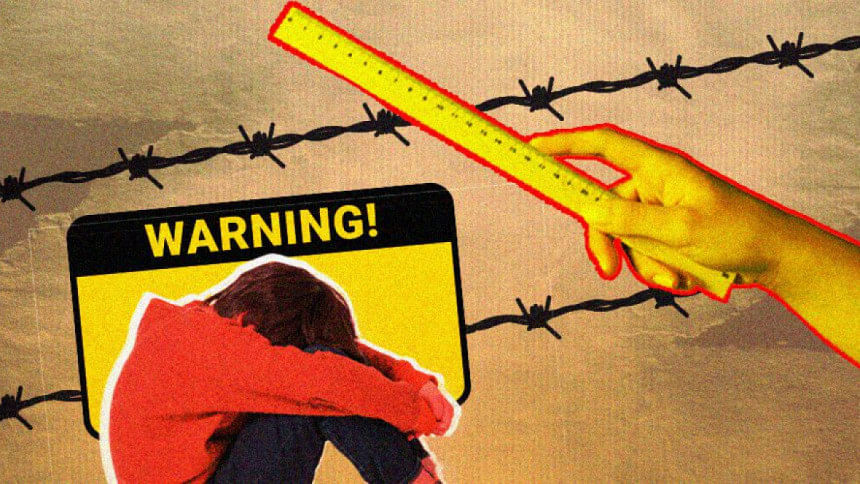We must end corporal punishment of children

Corporal punishment still remains the most common and socially accepted form of violence against children. According to UNICEF, 1.6 billion children (two in three) regularly face violent punishment at home worldwide; more than two-thirds are subjected to both physical punishment and psychological aggression.
In Bangladesh, the situation is alarming. The 2019 Multiple Indicator Cluster Survey, conducted jointly by the Bangladesh Bureau of Statistics and UNICEF, found that 88.8 percent of children aged 1-14 had experienced physical punishment in the month prior to the survey. Moreover, 35 percent of parents/caregivers believed that punishing children is necessary. While the Ministry of Education issued a circular in 2011 banning corporal punishment in educational institutions, children continue to face beatings and humiliation from teachers. Punishment also occurs at home, in institutions, and in workplaces.
Corporal punishment comprises any punishment in which physical force is used and intended to cause some degree of pain or discomfort, however light, as well as other non-physical forms of punishment that are also cruel and degrading. Corporal punishment violates children's human dignity and physical integrity, and is a blatant violation of their rights under the United Nations Convention on the Rights of the Child.
The widespread social acceptance of corporal punishment reveals how violence has become normalised in child-rearing. It reinforces children's subordinate status and paves the way for other forms of abuse. A 2021 report by the Global Partnership to End Violence Against Children reviewed over 300 studies linking punishment to a host of adverse outcomes. Not a single study identified any benefits.
Daily acts of punishment cause thousands of injuries and deaths among children each year. Corporal punishment has been linked to numerous negative consequences, including harm to children's physical and mental health, lower cognitive development and academic achievement, and it also contributes to school drop-out. Children who experience violent discipline are more likely to exhibit aggressive or bullying behaviour and may engage in criminal or anti-social behaviour later in life. Experiencing corporal punishment makes children sad, and it affects parent-child relationships.
Children place immense trust in their parents and teachers. When those in positions of trust resort to punishment, children begin to normalise violence in close relationships. This can lead to a cycle in which they grow up to either perpetrate or tolerate violence themselves. Without ending the practice of punishing children, we cannot hope to break the broader cycle of violence in society.
Around 40 years ago, Sweden and Finland had laws banning corporal punishment of children. Today, 68 countries have enacted laws to prohibit it in all settings—home, school, childcare centres, and institutions—to uphold children's rights and protect their dignity. Bangladesh is not yet on this list.
In my work on child rights across diverse contexts—including in Bangladesh, Papua New Guinea, and Liberia—I have repeatedly seen how efforts to legally prohibit corporal punishment are often met with resistance. Many parents, teachers, community leaders, and policymakers argue that physical discipline is part of long-standing cultural practices. But no tradition, however deeply rooted, can justify the infliction of harm on a child. Some keep making excuses that parents and teachers are under stress, and that is why they punish children. In many cases, parents and teachers do need more support, but that does not mean hitting or humiliating a child is justified. We never justify hitting an adult when we are stressed out. Why do we vent our frustrations on children?
Many parents and teachers in Bangladesh mistakenly believe that punishment helps children behave better. When adults hit or scold children in the name of teaching, the latter often learn only to avoid punishment, not to understand or internalise appropriate behaviour. This often leads to repetition of the same actions. Rather than resorting to punishment, parents should provide age-appropriate guidance rooted in care and compassion. This approach supports children's learning and development in meaningful ways. Educators, too, should adopt positive discipline strategies in their interactions with students.
People often stay silent even when witnessing a child being punished in public places, as it is socially accepted in Bangladesh. On social media, some parents even joke about punishing their children. People who are otherwise vocal about justice and human rights often remain indifferent when it comes to violence against children. Isn't this a serious contradiction?
However, legal reforms around the world have shown promise. Countries such as Sweden, Finland, Germany, New Zealand, Poland, and Romania have all seen a decline in public acceptance of corporal punishment following legislative action. The evidence is clear: we can shift societal attitudes and individual behaviours by enacting laws, promoting positive parenting, changing social norms, and ending violent discipline in schools.
Children have the same right as adults to be protected by law from violence. And this includes protection from violent punishment. In 2015, the world made a commitment to end violence against children by 2030. Every country signed up to SDG target 16.2, pledging to end exploitation, trafficking, torture, and all forms of violence against children.
We need urgent steps to fulfil this promise by 2030. Ending corporal punishment is essential in creating peaceful societies. In Bangladesh, it is vital to enact a new law that bans corporal punishment of children in all settings, including homes, schools, workplaces, and childcare institutions; to support the law through policies, programmes, and public awareness campaigns, and ensure its implementation is effectively monitored; to enforce and monitor the Ministry of Education's directive banning corporal punishment in educational institutions; to strengthen the capacity of parents and teachers to raise and guide children without using punishment; to include SDG indicator 16.2.1 at the national level to track progress; and to respect children's opinions and ensure their voices are heard in efforts to eliminate punishment.
When people and policymakers are discussing the reform agenda in various sectors, are we considering the legal reform required to ensure children are protected from violence? Are we ready to be child-sensitive and bring changes in our attitudes and behaviours towards them to ensure their growth and realise their full potential?
Laila Khondkar is an international development worker.
Views expressed in this article are the authors' own.
Follow The Daily Star Opinion on Facebook for the latest opinions, commentaries and analyses by experts and professionals. To contribute your article or letter to The Daily Star Opinion, see our guidelines for submission.

 For all latest news, follow The Daily Star's Google News channel.
For all latest news, follow The Daily Star's Google News channel. 








Comments